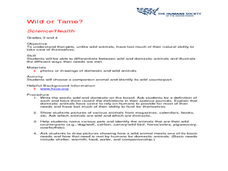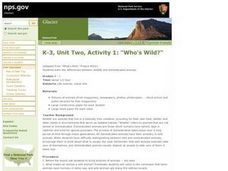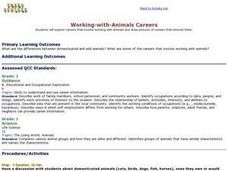Curated OER
Wild or Tame?
Students explore wild and domestic animals. In this animal lesson, students define wild and domestic. Students are shown pictures of animals and choose if they are wild or domestic. Students name pets and name their wild counterpart....
Curated OER
What's Wild
Third graders discover the differences between wild and domestic animals. In this animal lesson, 3rd graders chart the differences in the animals and look through magazines for pictures of wild and domestic animals to glue to a poster....
Curated OER
Artificial Selection
The second lesson in the series begins with a starter activity discussing wild versus domesticated animals. Then, scholars play a card game, with optional variations, to emphasize artificial selection. Next, they attend a field trip to a...
Curated OER
Who's Wild?
Students explore the differences between animals of the wild and domesticated animals. In this wild animals lesson, students understand that tame animals ancestors were once wild. Students illustrate the differences by...
Curated OER
Wild Dog Urine
Students investigate biology by researching wild animals. In this animal extinction lesson plan, students research African wild dogs and discuss the impact of the environment on their survival. Students read and analyze an article titled...
Curated OER
What's Wild? What's Not?
Students complete activities to differentiate between wild and domestic animals. In this animal types activity, students bring stuffed animals to class and pictures from magazines or newspaper. Students put their stuffed animals in a box...
Curated OER
Wild and Domestic Animals
In this wild and domestic animals activity, students label animal pictures, watch a video, and complete a word search. Students complete 3 activities.
Curated OER
Taming the Wild Aurochs
Sixth graders read and discuss the domestication of animals in history. In this Aurochs reading lesson, 6th graders define vocabulary and list similarities and differences between wild and domesticated animals. Students complete an...
Curated OER
Are you an Animal Sleuth?
Students define and identify both wild and domestic animals as well as mammals and non-mammals. In this animal safety lesson, students distinguish between animals that can carry rabies from those that cannot. Students use stuffed animals...
Curated OER
Jack London's The Call of the Wild: "Nature Faker"?
Students take a stand on whether or not London could be dubbed a "nature faker." They support their position with evidence either historical or from the text. Students write an essay, complete with hypothesis and textual support, on...
Curated OER
What's Wild?
Third graders define domesticated animal and wildlife. In this animal lesson, 3rd graders cut pictures out of magazines of both types of animals and make two collages with the pictures.
Curated OER
Where the Wild Things Shouldn't Be
Learners compare and contrast wild and domestic animal needs. In this animal welfare instructional activity, students read the poem Where the Wild Things Shouldn't Be and create a list of wild and domestic animals. Learners create a...
Curated OER
Wild or Domestic?
Students identify the differences between wild and domestic animals. In this animal science activity, students list examples of wild and domestic animals and take an online tour of a zoo.
Curated OER
Elsa the Lioness
Elsa is a lioness who was raised by humans in the 1950's. The Adamsons took her in after George Adamson reluctantly killed her mother. Elsa did return to the wild but maintained a very strong bond with the Adamsons until her death in...
Curated OER
Wild Or Domestic?
Students discuss differences between wild and domestic animals. They list animals on chart paper, and then cut out pictures from magazines to create large collage showing wild and domestic animals.
Curated OER
Jack London's The Call of the Wild: "Nature Faker"?
Students examine how Jack London tells a story from the point of view of an animal. They read and discuss primary source documents, analyze text and excerpts, complete a chart, and explore various websites.
Compassion in World Farming Trust
Selective Breeding of Farm Animals
Biology learners read about selective breeding in chickens and how it has produced high-yield meat specimens and rapid egg-layers. The unpleasant effects of artificial selection are explored, as well as options to supporting this...
Agriculture in the Classroom
A Rafter of Turkeys
How did that turkey get from the early Aztec culture to your table? Learn about the history of wild and domesticated turkeys in North America, as well as their inclusion in Thanksgiving traditions, with a two-part agricultural science...
Curated OER
Wildlife Conservation I
Focusing on the wildlife in their area, learners identify endangered and threatened species and what these animals need to survive. While this lesson involves animals in the Long Island area, it could be adapted for use with any area.
Curated OER
Taming the Wild Aurochs
Fourth graders assess the development of animal husbandry, outline it in detail as well as arrange the steps in sequential order. In addition, they discuss how certain animals came to be domesticated, concentrate to research on one of...
Curated OER
What's Wild?
Third graders examine pictures of animals before deciding if it is a wild animal or a domesticated animal. They discuss the difference between the two types of animals, where they live, what they eat, and what they need to survive. Using...
Curated OER
Working-with-Animals Careers
First graders list and discuss careers that involve working with animals and draw pictures of careers that interest them. They compare and contrast domestic and wild animals.
Curated OER
The Taming of the Few
Students consider the cultural, historical, and social implications of domesticating animals as pets. They create informative posters of various animals, illustrating their histories as pets.
Curated OER
A Forest Dwellers Quiz
In this forest animals instructional activity, students complete a four question multiple choice on-line interactive quiz. Included are questions about: wild boar, roe deer, red fox and red deer.

























